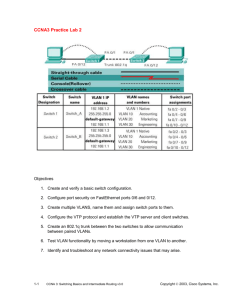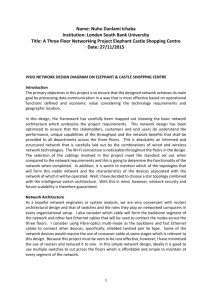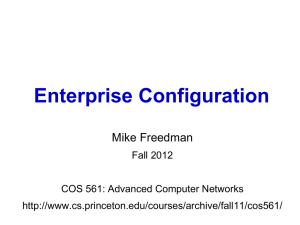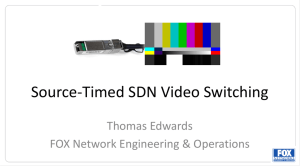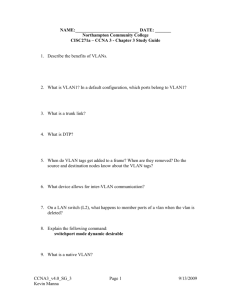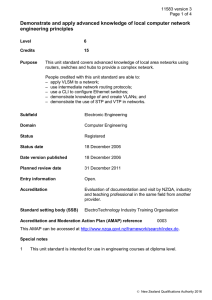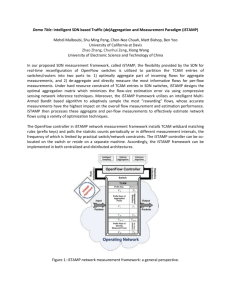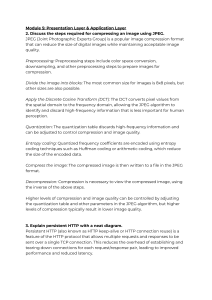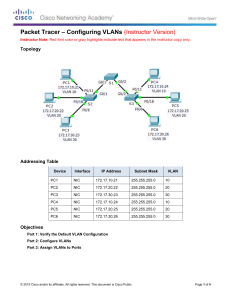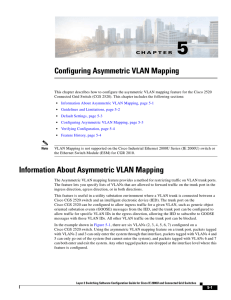SDN Software Stack
advertisement
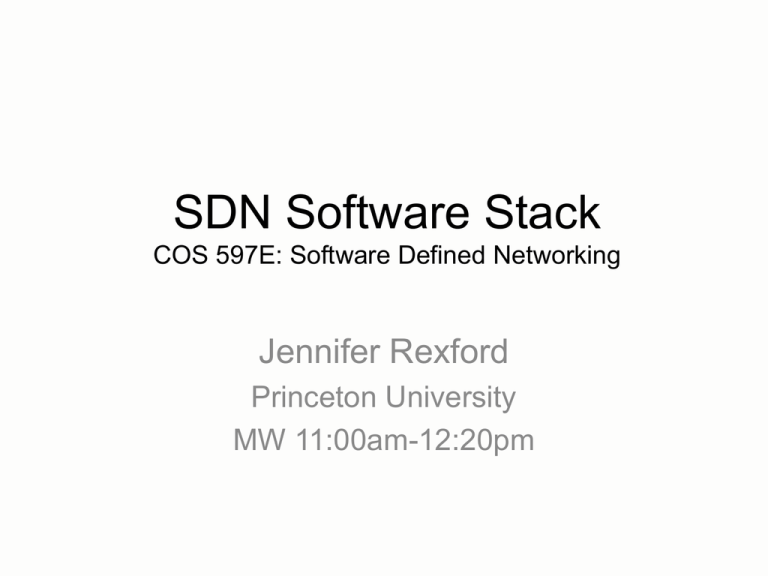
SDN Software Stack COS 597E: Software Defined Networking Jennifer Rexford Princeton University MW 11:00am-12:20pm Background: Enterprise Networks and VLANs 2 Simple Enterprise Design • Single layer-two subnet • Local services – Hubs and switches – Gateway to the Internet – Single IP address block – DHCP – DNS DHCP server S 1.2.3.1 S 1.2.3.0/24 G 1.2.3.76 S S 1.2.3.5 1.2.3.150 Internet 0.0.0.0/0 DNS server 3 Limitations of Simple Design • Performance • Scalability – Spanning tree – Large switch tables – Flooding overhead – Broadcast (ARP, DHCP) • Security – No access control – No isolation DHCP server S 1.2.3.1 S 1.2.3.0/24 G 1.2.3.76 S S 1.2.3.5 1.2.3.150 Internet 0.0.0.0/0 DNS server 4 Hybrid of Switches and Routers 1.2.3.0/26 R Ethernet Bridging - Flat addressing Self-learning Flooding Forwarding along a tree R IP Routing - 1.2.3.192/26 Hierarchical addressing Subnet configuration Host configuration Forwarding along shortest paths R Internet R 1.2.3.128/26 R 1.2.3.64/26 5 Virtual Local Area Networks • Group related hosts – Same company – Same role (e.g., faculty vs. students) – All WiFi users • Treat them as a single LAN – Single IP address block – Single broadcast domain – No access control • Independent of their location Rewire the network in software! 6 Example: Two VLANs R RO O R R O R R O O R O O O O R R Red VLAN and Orange VLAN Switches forward traffic as needed 7 Making VLANs Work • Changing the Ethernet header – Adding a field for a VLAN tag – Implemented on the bridges/switches – … but can interoperate with old Ethernet cards • Bridges/switches trunk links – Say which VLANs are accessible via which interfaces • Approaches to mapping access links to VLANs – Each interface has a VLAN “color” – Each MAC address has a VLAN “color” 8 VLANs in SDN • Hybrid deployment – VLAN for SDN adopters – Remaining traffic using legacy protocols • Switch-controller communication – Separate VLAN – Using legacy protocols • Tagging of packets – VLAN header as a virtual “tag” on packets 9 Server Virtualization and Virtual Switches 10 Virtual Machines (VMs) 11 Virtual Machine (VM) • Virtual machine – Software implementation of a computer – With interface identical to bare hardware – Devices, interrupts, memory, page tables, etc. • Hypervisor (virtual machine monitor) – Creates and runs virtual machines – Manages execution of the guest OSes – Subdivides the hardware resources – Executes privileged instructions 12 Motivations for VMs • Diverse operating systems – Running software for obsolete platforms – Research, experimentation, and testing • Sharing a single host – Server consolidation (lower cost, energy) – Isolation of applications or customers/tenants • Fast provisioning of new servers • Snapshotting system state – Backup and redeployment – Migrating a VM to a different host machine • VM introspection – Track configuration settings – Identify configuration mistakes or compromises 13 Virtual Switches 14 SDN Software Stack 15 SDN Software Stack Application Network OS API Switch Switch Switch 16 SDN Software Stack Application NOX OpenFlow OVS OVS OVS 17 Discussion • • • • • • What is a good “division of labor”? Good design for the protocol? Good abstractions for the NOS? How apt is the “operating system” analogy? What parts of the system need standards? What are interesting SDN applications? 18
